Coffee Industry in Singapore: Analysis, Trends, and Challenges
VerifiedAdded on 2022/12/15
|9
|2603
|117
Report
AI Summary
This report provides an in-depth analysis of the coffee industry in Singapore, covering various aspects such as market trends, consumer behavior, and competitive dynamics. It begins with an introduction to the coffee industry, highlighting the increasing demand for premium coffee and the evolution of café culture. The report then examines the closure of certain coffee brands, like Costa Coffee, and the reasons behind such closures, including high rental costs and the need for differentiated brand presence. A detailed Porter's Five Forces analysis evaluates competitive rivalry, bargaining power of buyers and suppliers, the threat of new entrants and substitutes. Furthermore, a PESTLE analysis explores the political, economic, social, technological, legal, and environmental factors influencing the coffee industry in Singapore. The report concludes with a summary of key findings and insights, emphasizing the importance of adapting to changing consumer preferences, and the need for continuous innovation to succeed in the competitive Singapore coffee market. The report also mentions the government's role in regulating the coffee industry and its increasing focus on sustainability.

qwertyuiopasdfghjklzxcvbnmqw
ertyuiopasdfghjklzxcvbnmqwert
yuiopasdfghjklzxcvbnmqwertyui
opasdfghjklzxcvbnmqwertyuiop
asdfghjklzxcvbnmqwertyuiopasd
fghjklzxcvbnmqwertyuiopasdfgh
jklzxcvbnmqwertyuiopasdfghjkl
zxcvbnmqwertyuiopasdfghjklzxc
vbnmqwertyuiopasdfghjklzxcvb
nmqwertyuiopasdfghjklzxcvbnm
qwertyuiopasdfghjklzxcvbnmqw
ertyuiopasdfghjklzxcvbnmqwert
yuiopasdfghjklzxcvbnmqwertyui
opasdfghjklzxcvbnmqwertyuiop
asdfghjklzxcvbnmqwertyuiopasd
fghjklzxcvbnmqwertyuiopasdfgh
jklzxcvbnmrtyuiopasdfghjklzxcv
Management (Coffee Industry of Singapore)
ertyuiopasdfghjklzxcvbnmqwert
yuiopasdfghjklzxcvbnmqwertyui
opasdfghjklzxcvbnmqwertyuiop
asdfghjklzxcvbnmqwertyuiopasd
fghjklzxcvbnmqwertyuiopasdfgh
jklzxcvbnmqwertyuiopasdfghjkl
zxcvbnmqwertyuiopasdfghjklzxc
vbnmqwertyuiopasdfghjklzxcvb
nmqwertyuiopasdfghjklzxcvbnm
qwertyuiopasdfghjklzxcvbnmqw
ertyuiopasdfghjklzxcvbnmqwert
yuiopasdfghjklzxcvbnmqwertyui
opasdfghjklzxcvbnmqwertyuiop
asdfghjklzxcvbnmqwertyuiopasd
fghjklzxcvbnmqwertyuiopasdfgh
jklzxcvbnmrtyuiopasdfghjklzxcv
Management (Coffee Industry of Singapore)
Paraphrase This Document
Need a fresh take? Get an instant paraphrase of this document with our AI Paraphraser
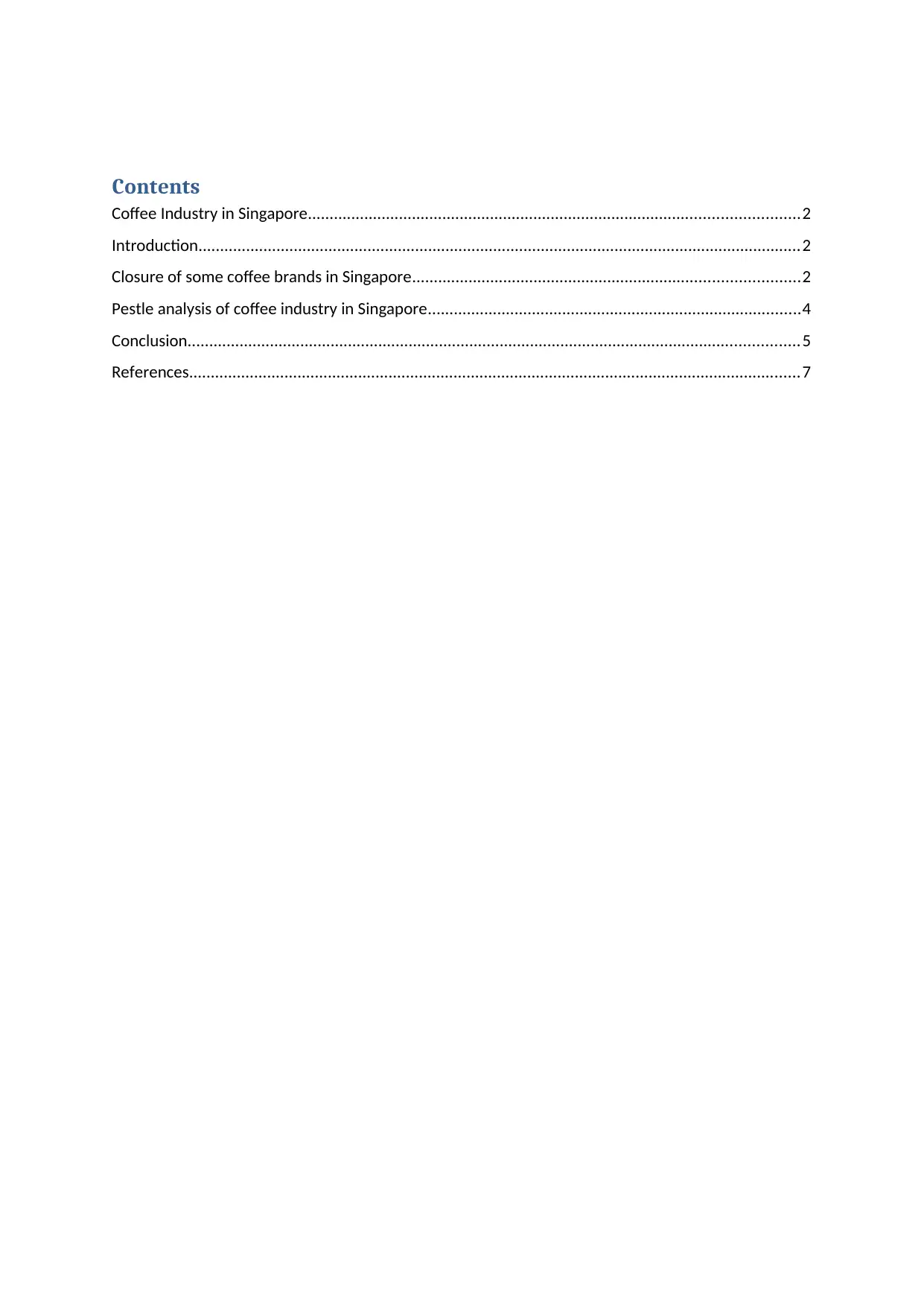
Contents
Coffee Industry in Singapore.................................................................................................................2
Introduction...........................................................................................................................................2
Closure of some coffee brands in Singapore.........................................................................................2
Pestle analysis of coffee industry in Singapore......................................................................................4
Conclusion.............................................................................................................................................5
References.............................................................................................................................................7
Coffee Industry in Singapore.................................................................................................................2
Introduction...........................................................................................................................................2
Closure of some coffee brands in Singapore.........................................................................................2
Pestle analysis of coffee industry in Singapore......................................................................................4
Conclusion.............................................................................................................................................5
References.............................................................................................................................................7
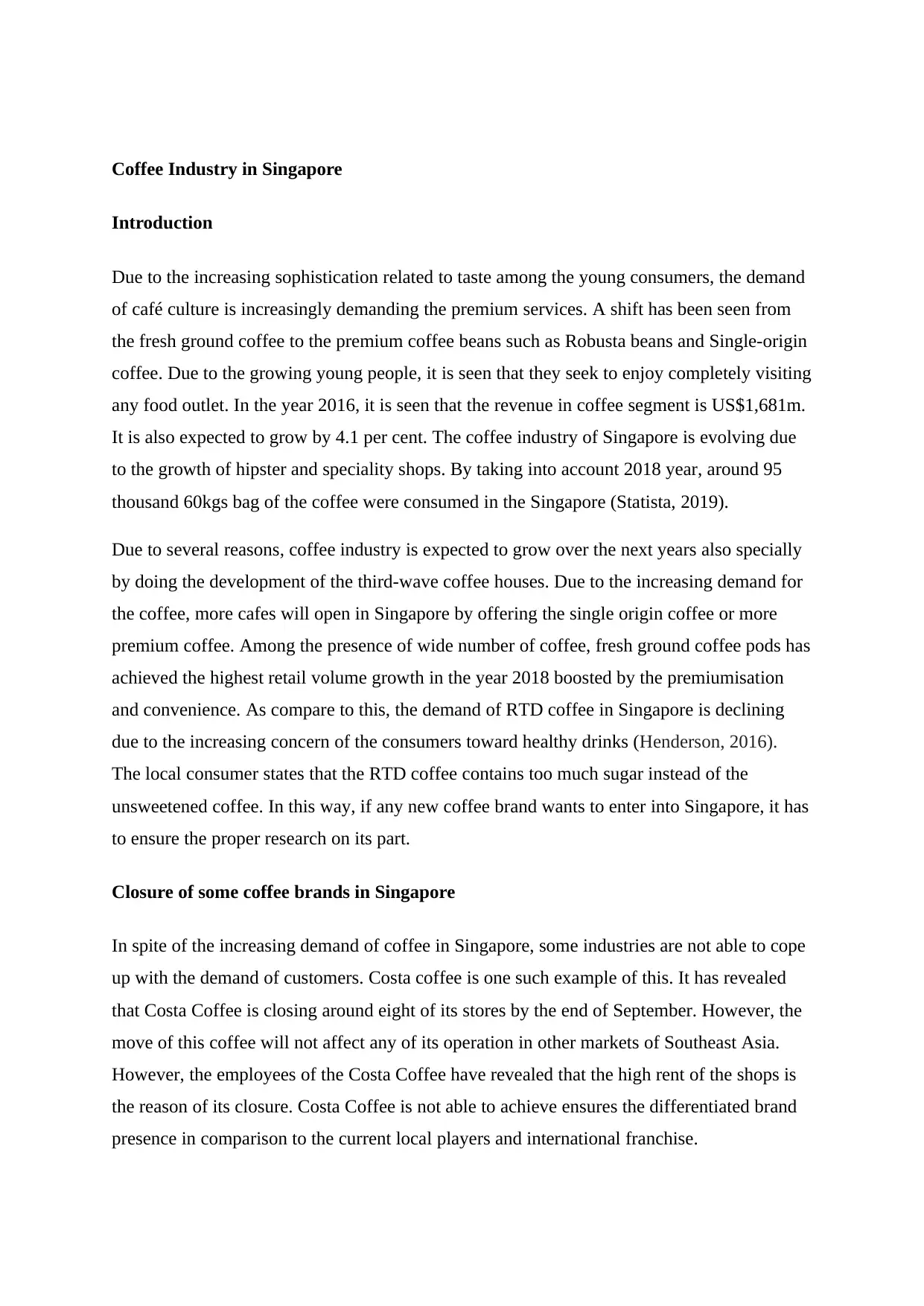
Coffee Industry in Singapore
Introduction
Due to the increasing sophistication related to taste among the young consumers, the demand
of café culture is increasingly demanding the premium services. A shift has been seen from
the fresh ground coffee to the premium coffee beans such as Robusta beans and Single-origin
coffee. Due to the growing young people, it is seen that they seek to enjoy completely visiting
any food outlet. In the year 2016, it is seen that the revenue in coffee segment is US$1,681m.
It is also expected to grow by 4.1 per cent. The coffee industry of Singapore is evolving due
to the growth of hipster and speciality shops. By taking into account 2018 year, around 95
thousand 60kgs bag of the coffee were consumed in the Singapore (Statista, 2019).
Due to several reasons, coffee industry is expected to grow over the next years also specially
by doing the development of the third-wave coffee houses. Due to the increasing demand for
the coffee, more cafes will open in Singapore by offering the single origin coffee or more
premium coffee. Among the presence of wide number of coffee, fresh ground coffee pods has
achieved the highest retail volume growth in the year 2018 boosted by the premiumisation
and convenience. As compare to this, the demand of RTD coffee in Singapore is declining
due to the increasing concern of the consumers toward healthy drinks (Henderson, 2016).
The local consumer states that the RTD coffee contains too much sugar instead of the
unsweetened coffee. In this way, if any new coffee brand wants to enter into Singapore, it has
to ensure the proper research on its part.
Closure of some coffee brands in Singapore
In spite of the increasing demand of coffee in Singapore, some industries are not able to cope
up with the demand of customers. Costa coffee is one such example of this. It has revealed
that Costa Coffee is closing around eight of its stores by the end of September. However, the
move of this coffee will not affect any of its operation in other markets of Southeast Asia.
However, the employees of the Costa Coffee have revealed that the high rent of the shops is
the reason of its closure. Costa Coffee is not able to achieve ensures the differentiated brand
presence in comparison to the current local players and international franchise.
Introduction
Due to the increasing sophistication related to taste among the young consumers, the demand
of café culture is increasingly demanding the premium services. A shift has been seen from
the fresh ground coffee to the premium coffee beans such as Robusta beans and Single-origin
coffee. Due to the growing young people, it is seen that they seek to enjoy completely visiting
any food outlet. In the year 2016, it is seen that the revenue in coffee segment is US$1,681m.
It is also expected to grow by 4.1 per cent. The coffee industry of Singapore is evolving due
to the growth of hipster and speciality shops. By taking into account 2018 year, around 95
thousand 60kgs bag of the coffee were consumed in the Singapore (Statista, 2019).
Due to several reasons, coffee industry is expected to grow over the next years also specially
by doing the development of the third-wave coffee houses. Due to the increasing demand for
the coffee, more cafes will open in Singapore by offering the single origin coffee or more
premium coffee. Among the presence of wide number of coffee, fresh ground coffee pods has
achieved the highest retail volume growth in the year 2018 boosted by the premiumisation
and convenience. As compare to this, the demand of RTD coffee in Singapore is declining
due to the increasing concern of the consumers toward healthy drinks (Henderson, 2016).
The local consumer states that the RTD coffee contains too much sugar instead of the
unsweetened coffee. In this way, if any new coffee brand wants to enter into Singapore, it has
to ensure the proper research on its part.
Closure of some coffee brands in Singapore
In spite of the increasing demand of coffee in Singapore, some industries are not able to cope
up with the demand of customers. Costa coffee is one such example of this. It has revealed
that Costa Coffee is closing around eight of its stores by the end of September. However, the
move of this coffee will not affect any of its operation in other markets of Southeast Asia.
However, the employees of the Costa Coffee have revealed that the high rent of the shops is
the reason of its closure. Costa Coffee is not able to achieve ensures the differentiated brand
presence in comparison to the current local players and international franchise.
⊘ This is a preview!⊘
Do you want full access?
Subscribe today to unlock all pages.

Trusted by 1+ million students worldwide
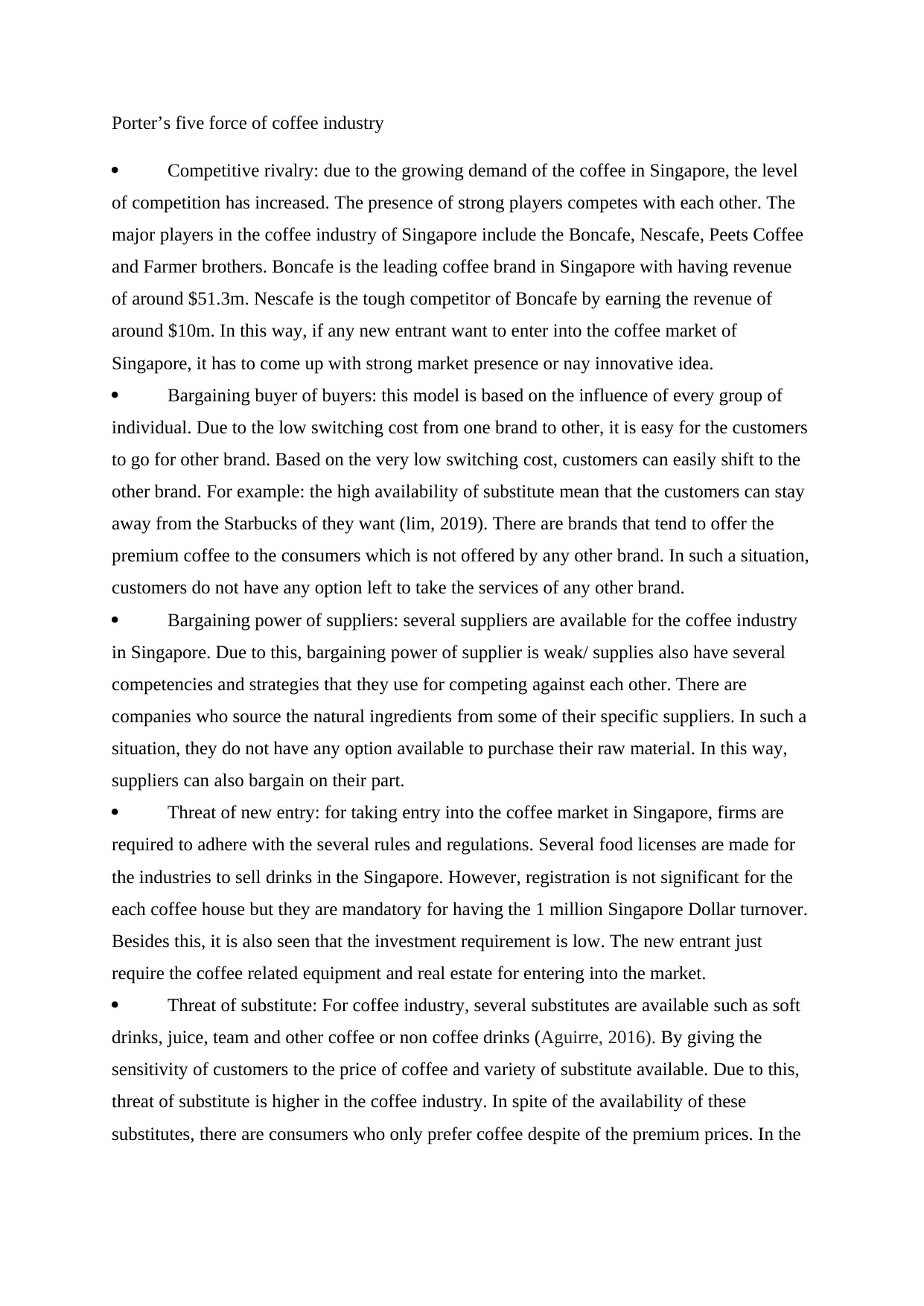
Porter’s five force of coffee industry
Competitive rivalry: due to the growing demand of the coffee in Singapore, the level
of competition has increased. The presence of strong players competes with each other. The
major players in the coffee industry of Singapore include the Boncafe, Nescafe, Peets Coffee
and Farmer brothers. Boncafe is the leading coffee brand in Singapore with having revenue
of around $51.3m. Nescafe is the tough competitor of Boncafe by earning the revenue of
around $10m. In this way, if any new entrant want to enter into the coffee market of
Singapore, it has to come up with strong market presence or nay innovative idea.
Bargaining buyer of buyers: this model is based on the influence of every group of
individual. Due to the low switching cost from one brand to other, it is easy for the customers
to go for other brand. Based on the very low switching cost, customers can easily shift to the
other brand. For example: the high availability of substitute mean that the customers can stay
away from the Starbucks of they want (lim, 2019). There are brands that tend to offer the
premium coffee to the consumers which is not offered by any other brand. In such a situation,
customers do not have any option left to take the services of any other brand.
Bargaining power of suppliers: several suppliers are available for the coffee industry
in Singapore. Due to this, bargaining power of supplier is weak/ supplies also have several
competencies and strategies that they use for competing against each other. There are
companies who source the natural ingredients from some of their specific suppliers. In such a
situation, they do not have any option available to purchase their raw material. In this way,
suppliers can also bargain on their part.
Threat of new entry: for taking entry into the coffee market in Singapore, firms are
required to adhere with the several rules and regulations. Several food licenses are made for
the industries to sell drinks in the Singapore. However, registration is not significant for the
each coffee house but they are mandatory for having the 1 million Singapore Dollar turnover.
Besides this, it is also seen that the investment requirement is low. The new entrant just
require the coffee related equipment and real estate for entering into the market.
Threat of substitute: For coffee industry, several substitutes are available such as soft
drinks, juice, team and other coffee or non coffee drinks (Aguirre, 2016). By giving the
sensitivity of customers to the price of coffee and variety of substitute available. Due to this,
threat of substitute is higher in the coffee industry. In spite of the availability of these
substitutes, there are consumers who only prefer coffee despite of the premium prices. In the
Competitive rivalry: due to the growing demand of the coffee in Singapore, the level
of competition has increased. The presence of strong players competes with each other. The
major players in the coffee industry of Singapore include the Boncafe, Nescafe, Peets Coffee
and Farmer brothers. Boncafe is the leading coffee brand in Singapore with having revenue
of around $51.3m. Nescafe is the tough competitor of Boncafe by earning the revenue of
around $10m. In this way, if any new entrant want to enter into the coffee market of
Singapore, it has to come up with strong market presence or nay innovative idea.
Bargaining buyer of buyers: this model is based on the influence of every group of
individual. Due to the low switching cost from one brand to other, it is easy for the customers
to go for other brand. Based on the very low switching cost, customers can easily shift to the
other brand. For example: the high availability of substitute mean that the customers can stay
away from the Starbucks of they want (lim, 2019). There are brands that tend to offer the
premium coffee to the consumers which is not offered by any other brand. In such a situation,
customers do not have any option left to take the services of any other brand.
Bargaining power of suppliers: several suppliers are available for the coffee industry
in Singapore. Due to this, bargaining power of supplier is weak/ supplies also have several
competencies and strategies that they use for competing against each other. There are
companies who source the natural ingredients from some of their specific suppliers. In such a
situation, they do not have any option available to purchase their raw material. In this way,
suppliers can also bargain on their part.
Threat of new entry: for taking entry into the coffee market in Singapore, firms are
required to adhere with the several rules and regulations. Several food licenses are made for
the industries to sell drinks in the Singapore. However, registration is not significant for the
each coffee house but they are mandatory for having the 1 million Singapore Dollar turnover.
Besides this, it is also seen that the investment requirement is low. The new entrant just
require the coffee related equipment and real estate for entering into the market.
Threat of substitute: For coffee industry, several substitutes are available such as soft
drinks, juice, team and other coffee or non coffee drinks (Aguirre, 2016). By giving the
sensitivity of customers to the price of coffee and variety of substitute available. Due to this,
threat of substitute is higher in the coffee industry. In spite of the availability of these
substitutes, there are consumers who only prefer coffee despite of the premium prices. In the
Paraphrase This Document
Need a fresh take? Get an instant paraphrase of this document with our AI Paraphraser
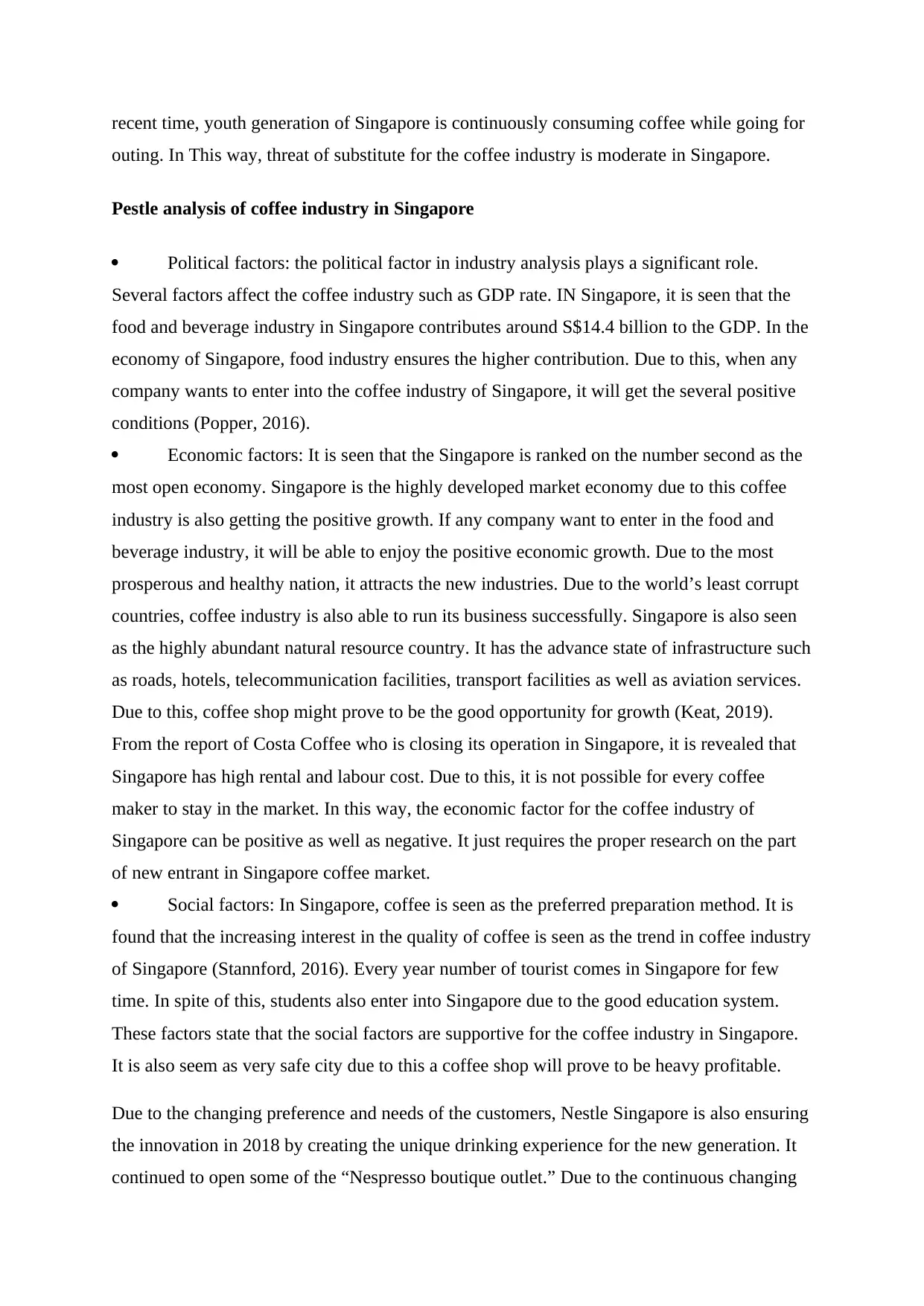
recent time, youth generation of Singapore is continuously consuming coffee while going for
outing. In This way, threat of substitute for the coffee industry is moderate in Singapore.
Pestle analysis of coffee industry in Singapore
Political factors: the political factor in industry analysis plays a significant role.
Several factors affect the coffee industry such as GDP rate. IN Singapore, it is seen that the
food and beverage industry in Singapore contributes around S$14.4 billion to the GDP. In the
economy of Singapore, food industry ensures the higher contribution. Due to this, when any
company wants to enter into the coffee industry of Singapore, it will get the several positive
conditions (Popper, 2016).
Economic factors: It is seen that the Singapore is ranked on the number second as the
most open economy. Singapore is the highly developed market economy due to this coffee
industry is also getting the positive growth. If any company want to enter in the food and
beverage industry, it will be able to enjoy the positive economic growth. Due to the most
prosperous and healthy nation, it attracts the new industries. Due to the world’s least corrupt
countries, coffee industry is also able to run its business successfully. Singapore is also seen
as the highly abundant natural resource country. It has the advance state of infrastructure such
as roads, hotels, telecommunication facilities, transport facilities as well as aviation services.
Due to this, coffee shop might prove to be the good opportunity for growth (Keat, 2019).
From the report of Costa Coffee who is closing its operation in Singapore, it is revealed that
Singapore has high rental and labour cost. Due to this, it is not possible for every coffee
maker to stay in the market. In this way, the economic factor for the coffee industry of
Singapore can be positive as well as negative. It just requires the proper research on the part
of new entrant in Singapore coffee market.
Social factors: In Singapore, coffee is seen as the preferred preparation method. It is
found that the increasing interest in the quality of coffee is seen as the trend in coffee industry
of Singapore (Stannford, 2016). Every year number of tourist comes in Singapore for few
time. In spite of this, students also enter into Singapore due to the good education system.
These factors state that the social factors are supportive for the coffee industry in Singapore.
It is also seem as very safe city due to this a coffee shop will prove to be heavy profitable.
Due to the changing preference and needs of the customers, Nestle Singapore is also ensuring
the innovation in 2018 by creating the unique drinking experience for the new generation. It
continued to open some of the “Nespresso boutique outlet.” Due to the continuous changing
outing. In This way, threat of substitute for the coffee industry is moderate in Singapore.
Pestle analysis of coffee industry in Singapore
Political factors: the political factor in industry analysis plays a significant role.
Several factors affect the coffee industry such as GDP rate. IN Singapore, it is seen that the
food and beverage industry in Singapore contributes around S$14.4 billion to the GDP. In the
economy of Singapore, food industry ensures the higher contribution. Due to this, when any
company wants to enter into the coffee industry of Singapore, it will get the several positive
conditions (Popper, 2016).
Economic factors: It is seen that the Singapore is ranked on the number second as the
most open economy. Singapore is the highly developed market economy due to this coffee
industry is also getting the positive growth. If any company want to enter in the food and
beverage industry, it will be able to enjoy the positive economic growth. Due to the most
prosperous and healthy nation, it attracts the new industries. Due to the world’s least corrupt
countries, coffee industry is also able to run its business successfully. Singapore is also seen
as the highly abundant natural resource country. It has the advance state of infrastructure such
as roads, hotels, telecommunication facilities, transport facilities as well as aviation services.
Due to this, coffee shop might prove to be the good opportunity for growth (Keat, 2019).
From the report of Costa Coffee who is closing its operation in Singapore, it is revealed that
Singapore has high rental and labour cost. Due to this, it is not possible for every coffee
maker to stay in the market. In this way, the economic factor for the coffee industry of
Singapore can be positive as well as negative. It just requires the proper research on the part
of new entrant in Singapore coffee market.
Social factors: In Singapore, coffee is seen as the preferred preparation method. It is
found that the increasing interest in the quality of coffee is seen as the trend in coffee industry
of Singapore (Stannford, 2016). Every year number of tourist comes in Singapore for few
time. In spite of this, students also enter into Singapore due to the good education system.
These factors state that the social factors are supportive for the coffee industry in Singapore.
It is also seem as very safe city due to this a coffee shop will prove to be heavy profitable.
Due to the changing preference and needs of the customers, Nestle Singapore is also ensuring
the innovation in 2018 by creating the unique drinking experience for the new generation. It
continued to open some of the “Nespresso boutique outlet.” Due to the continuous changing
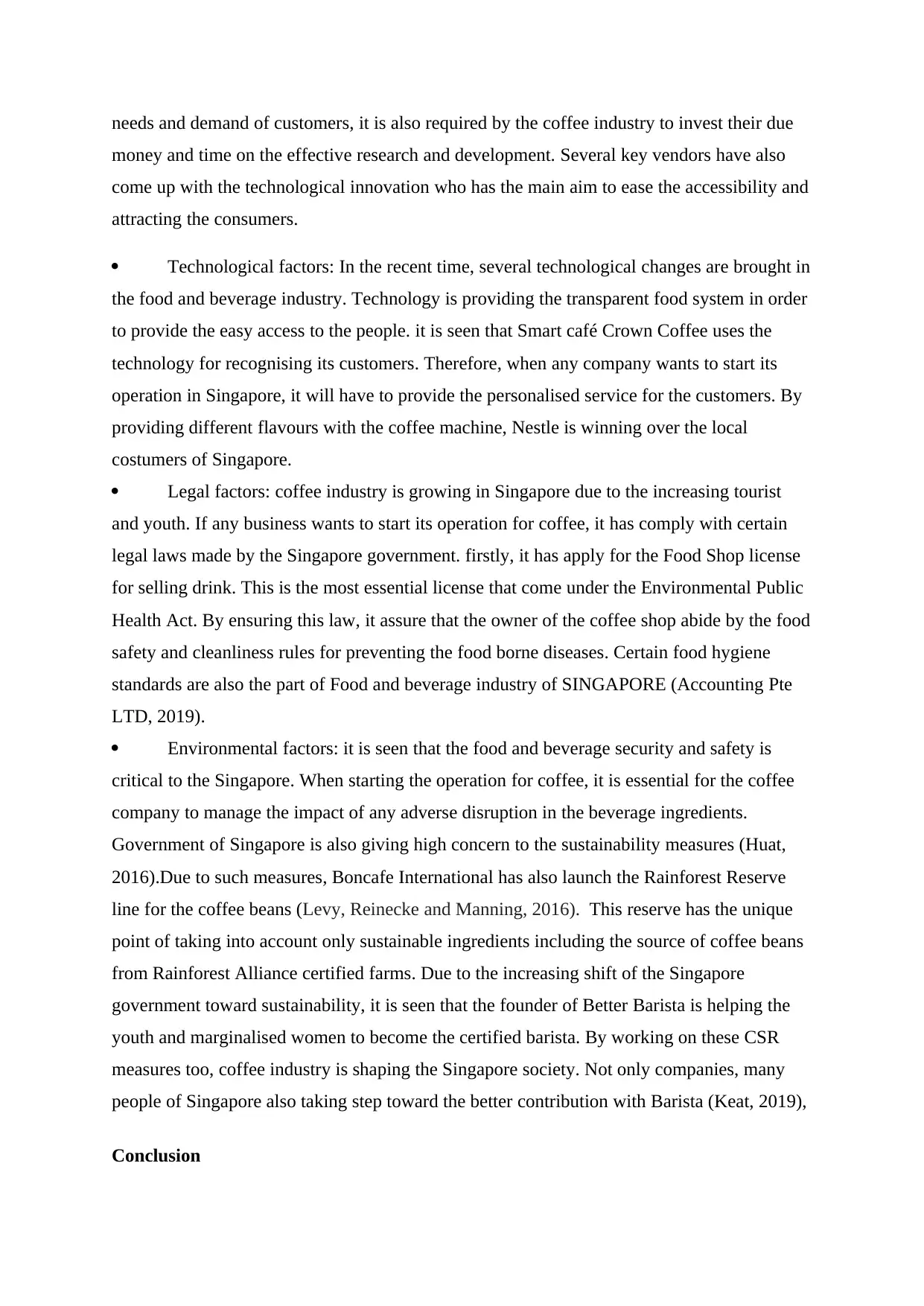
needs and demand of customers, it is also required by the coffee industry to invest their due
money and time on the effective research and development. Several key vendors have also
come up with the technological innovation who has the main aim to ease the accessibility and
attracting the consumers.
Technological factors: In the recent time, several technological changes are brought in
the food and beverage industry. Technology is providing the transparent food system in order
to provide the easy access to the people. it is seen that Smart café Crown Coffee uses the
technology for recognising its customers. Therefore, when any company wants to start its
operation in Singapore, it will have to provide the personalised service for the customers. By
providing different flavours with the coffee machine, Nestle is winning over the local
costumers of Singapore.
Legal factors: coffee industry is growing in Singapore due to the increasing tourist
and youth. If any business wants to start its operation for coffee, it has comply with certain
legal laws made by the Singapore government. firstly, it has apply for the Food Shop license
for selling drink. This is the most essential license that come under the Environmental Public
Health Act. By ensuring this law, it assure that the owner of the coffee shop abide by the food
safety and cleanliness rules for preventing the food borne diseases. Certain food hygiene
standards are also the part of Food and beverage industry of SINGAPORE (Accounting Pte
LTD, 2019).
Environmental factors: it is seen that the food and beverage security and safety is
critical to the Singapore. When starting the operation for coffee, it is essential for the coffee
company to manage the impact of any adverse disruption in the beverage ingredients.
Government of Singapore is also giving high concern to the sustainability measures (Huat,
2016).Due to such measures, Boncafe International has also launch the Rainforest Reserve
line for the coffee beans (Levy, Reinecke and Manning, 2016). This reserve has the unique
point of taking into account only sustainable ingredients including the source of coffee beans
from Rainforest Alliance certified farms. Due to the increasing shift of the Singapore
government toward sustainability, it is seen that the founder of Better Barista is helping the
youth and marginalised women to become the certified barista. By working on these CSR
measures too, coffee industry is shaping the Singapore society. Not only companies, many
people of Singapore also taking step toward the better contribution with Barista (Keat, 2019),
Conclusion
money and time on the effective research and development. Several key vendors have also
come up with the technological innovation who has the main aim to ease the accessibility and
attracting the consumers.
Technological factors: In the recent time, several technological changes are brought in
the food and beverage industry. Technology is providing the transparent food system in order
to provide the easy access to the people. it is seen that Smart café Crown Coffee uses the
technology for recognising its customers. Therefore, when any company wants to start its
operation in Singapore, it will have to provide the personalised service for the customers. By
providing different flavours with the coffee machine, Nestle is winning over the local
costumers of Singapore.
Legal factors: coffee industry is growing in Singapore due to the increasing tourist
and youth. If any business wants to start its operation for coffee, it has comply with certain
legal laws made by the Singapore government. firstly, it has apply for the Food Shop license
for selling drink. This is the most essential license that come under the Environmental Public
Health Act. By ensuring this law, it assure that the owner of the coffee shop abide by the food
safety and cleanliness rules for preventing the food borne diseases. Certain food hygiene
standards are also the part of Food and beverage industry of SINGAPORE (Accounting Pte
LTD, 2019).
Environmental factors: it is seen that the food and beverage security and safety is
critical to the Singapore. When starting the operation for coffee, it is essential for the coffee
company to manage the impact of any adverse disruption in the beverage ingredients.
Government of Singapore is also giving high concern to the sustainability measures (Huat,
2016).Due to such measures, Boncafe International has also launch the Rainforest Reserve
line for the coffee beans (Levy, Reinecke and Manning, 2016). This reserve has the unique
point of taking into account only sustainable ingredients including the source of coffee beans
from Rainforest Alliance certified farms. Due to the increasing shift of the Singapore
government toward sustainability, it is seen that the founder of Better Barista is helping the
youth and marginalised women to become the certified barista. By working on these CSR
measures too, coffee industry is shaping the Singapore society. Not only companies, many
people of Singapore also taking step toward the better contribution with Barista (Keat, 2019),
Conclusion
⊘ This is a preview!⊘
Do you want full access?
Subscribe today to unlock all pages.

Trusted by 1+ million students worldwide
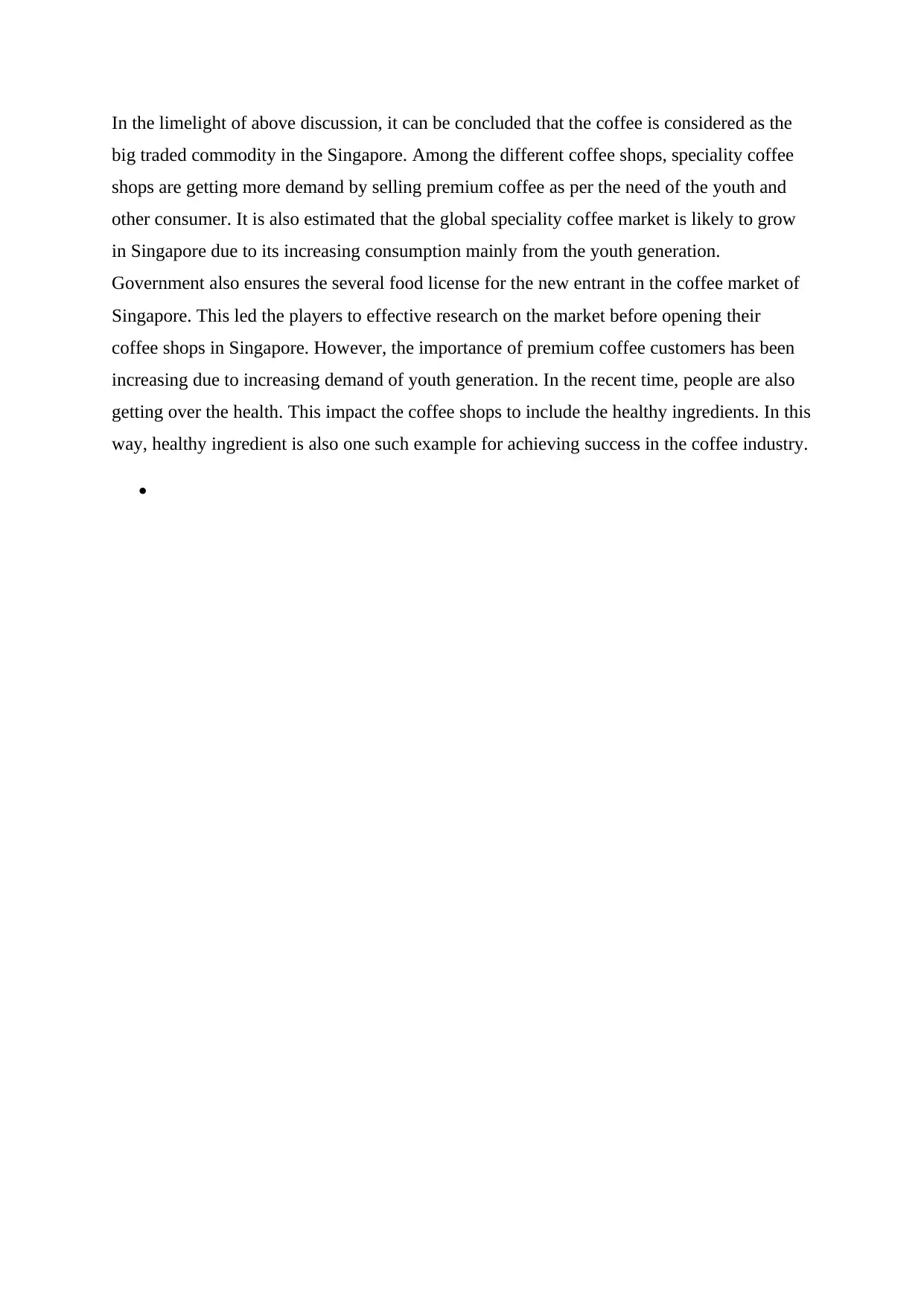
In the limelight of above discussion, it can be concluded that the coffee is considered as the
big traded commodity in the Singapore. Among the different coffee shops, speciality coffee
shops are getting more demand by selling premium coffee as per the need of the youth and
other consumer. It is also estimated that the global speciality coffee market is likely to grow
in Singapore due to its increasing consumption mainly from the youth generation.
Government also ensures the several food license for the new entrant in the coffee market of
Singapore. This led the players to effective research on the market before opening their
coffee shops in Singapore. However, the importance of premium coffee customers has been
increasing due to increasing demand of youth generation. In the recent time, people are also
getting over the health. This impact the coffee shops to include the healthy ingredients. In this
way, healthy ingredient is also one such example for achieving success in the coffee industry.
big traded commodity in the Singapore. Among the different coffee shops, speciality coffee
shops are getting more demand by selling premium coffee as per the need of the youth and
other consumer. It is also estimated that the global speciality coffee market is likely to grow
in Singapore due to its increasing consumption mainly from the youth generation.
Government also ensures the several food license for the new entrant in the coffee market of
Singapore. This led the players to effective research on the market before opening their
coffee shops in Singapore. However, the importance of premium coffee customers has been
increasing due to increasing demand of youth generation. In the recent time, people are also
getting over the health. This impact the coffee shops to include the healthy ingredients. In this
way, healthy ingredient is also one such example for achieving success in the coffee industry.
Paraphrase This Document
Need a fresh take? Get an instant paraphrase of this document with our AI Paraphraser
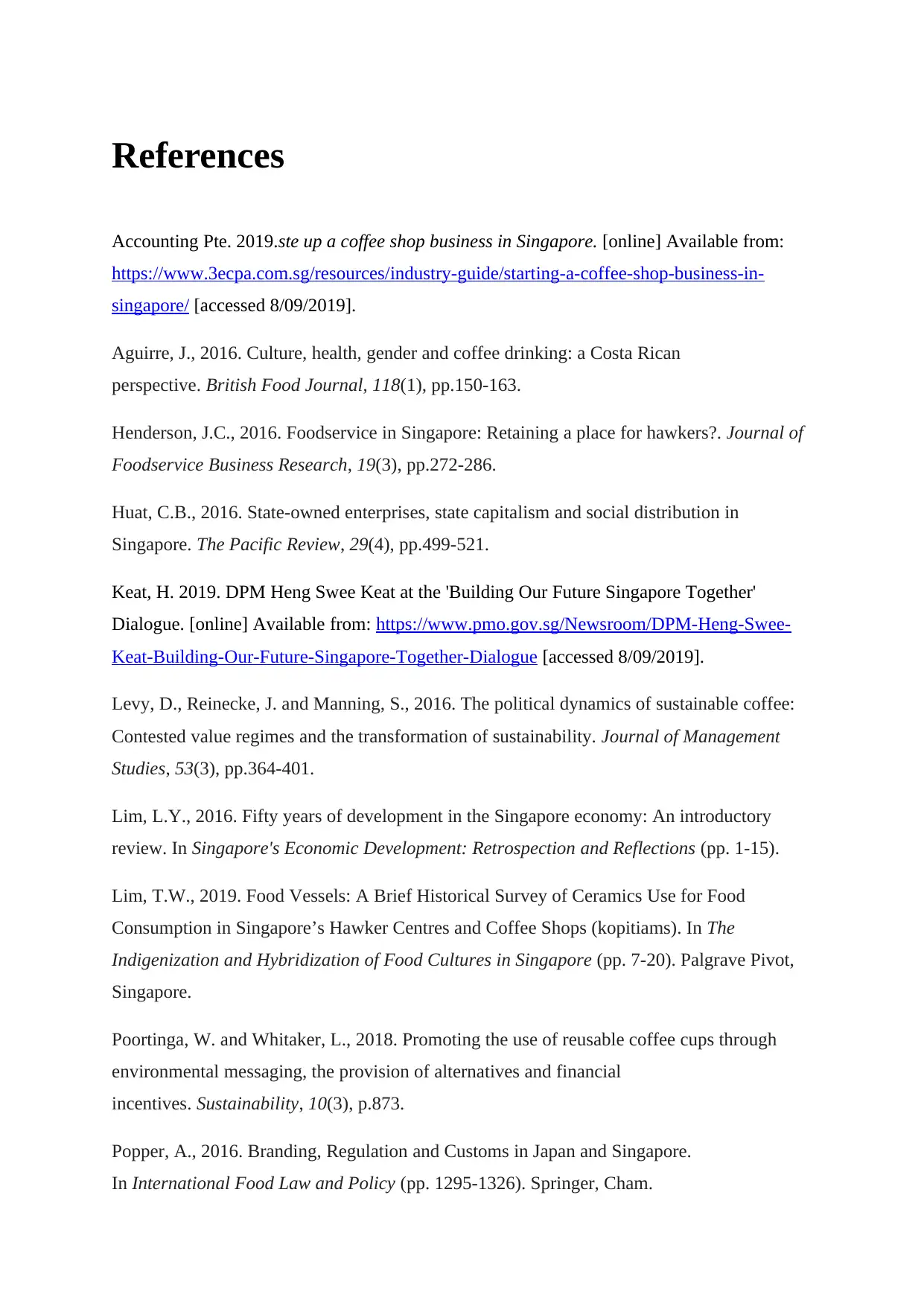
References
Accounting Pte. 2019.ste up a coffee shop business in Singapore. [online] Available from:
https://www.3ecpa.com.sg/resources/industry-guide/starting-a-coffee-shop-business-in-
singapore/ [accessed 8/09/2019].
Aguirre, J., 2016. Culture, health, gender and coffee drinking: a Costa Rican
perspective. British Food Journal, 118(1), pp.150-163.
Henderson, J.C., 2016. Foodservice in Singapore: Retaining a place for hawkers?. Journal of
Foodservice Business Research, 19(3), pp.272-286.
Huat, C.B., 2016. State-owned enterprises, state capitalism and social distribution in
Singapore. The Pacific Review, 29(4), pp.499-521.
Keat, H. 2019. DPM Heng Swee Keat at the 'Building Our Future Singapore Together'
Dialogue. [online] Available from: https://www.pmo.gov.sg/Newsroom/DPM-Heng-Swee-
Keat-Building-Our-Future-Singapore-Together-Dialogue [accessed 8/09/2019].
Levy, D., Reinecke, J. and Manning, S., 2016. The political dynamics of sustainable coffee:
Contested value regimes and the transformation of sustainability. Journal of Management
Studies, 53(3), pp.364-401.
Lim, L.Y., 2016. Fifty years of development in the Singapore economy: An introductory
review. In Singapore's Economic Development: Retrospection and Reflections (pp. 1-15).
Lim, T.W., 2019. Food Vessels: A Brief Historical Survey of Ceramics Use for Food
Consumption in Singapore’s Hawker Centres and Coffee Shops (kopitiams). In The
Indigenization and Hybridization of Food Cultures in Singapore (pp. 7-20). Palgrave Pivot,
Singapore.
Poortinga, W. and Whitaker, L., 2018. Promoting the use of reusable coffee cups through
environmental messaging, the provision of alternatives and financial
incentives. Sustainability, 10(3), p.873.
Popper, A., 2016. Branding, Regulation and Customs in Japan and Singapore.
In International Food Law and Policy (pp. 1295-1326). Springer, Cham.
Accounting Pte. 2019.ste up a coffee shop business in Singapore. [online] Available from:
https://www.3ecpa.com.sg/resources/industry-guide/starting-a-coffee-shop-business-in-
singapore/ [accessed 8/09/2019].
Aguirre, J., 2016. Culture, health, gender and coffee drinking: a Costa Rican
perspective. British Food Journal, 118(1), pp.150-163.
Henderson, J.C., 2016. Foodservice in Singapore: Retaining a place for hawkers?. Journal of
Foodservice Business Research, 19(3), pp.272-286.
Huat, C.B., 2016. State-owned enterprises, state capitalism and social distribution in
Singapore. The Pacific Review, 29(4), pp.499-521.
Keat, H. 2019. DPM Heng Swee Keat at the 'Building Our Future Singapore Together'
Dialogue. [online] Available from: https://www.pmo.gov.sg/Newsroom/DPM-Heng-Swee-
Keat-Building-Our-Future-Singapore-Together-Dialogue [accessed 8/09/2019].
Levy, D., Reinecke, J. and Manning, S., 2016. The political dynamics of sustainable coffee:
Contested value regimes and the transformation of sustainability. Journal of Management
Studies, 53(3), pp.364-401.
Lim, L.Y., 2016. Fifty years of development in the Singapore economy: An introductory
review. In Singapore's Economic Development: Retrospection and Reflections (pp. 1-15).
Lim, T.W., 2019. Food Vessels: A Brief Historical Survey of Ceramics Use for Food
Consumption in Singapore’s Hawker Centres and Coffee Shops (kopitiams). In The
Indigenization and Hybridization of Food Cultures in Singapore (pp. 7-20). Palgrave Pivot,
Singapore.
Poortinga, W. and Whitaker, L., 2018. Promoting the use of reusable coffee cups through
environmental messaging, the provision of alternatives and financial
incentives. Sustainability, 10(3), p.873.
Popper, A., 2016. Branding, Regulation and Customs in Japan and Singapore.
In International Food Law and Policy (pp. 1295-1326). Springer, Cham.
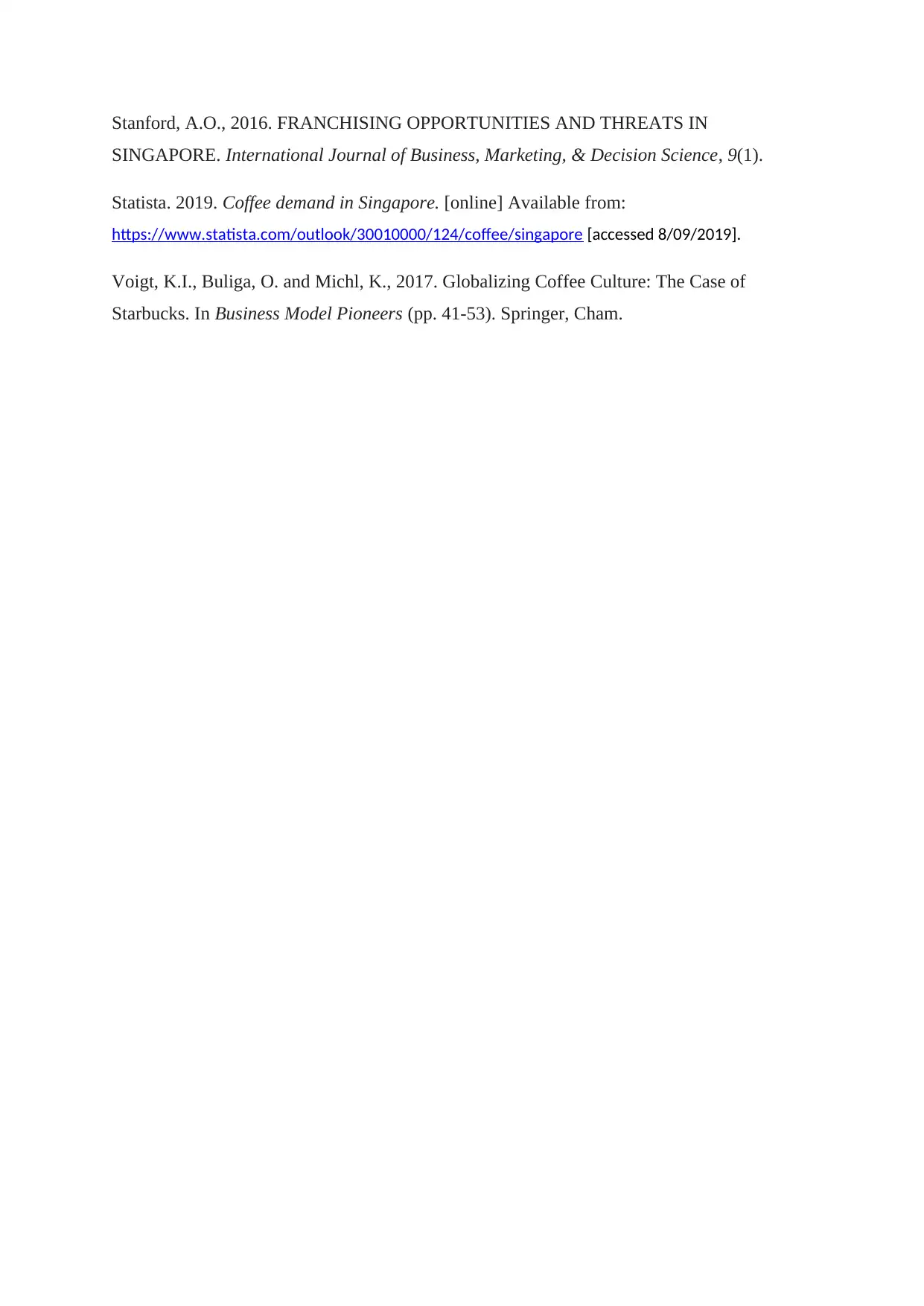
Stanford, A.O., 2016. FRANCHISING OPPORTUNITIES AND THREATS IN
SINGAPORE. International Journal of Business, Marketing, & Decision Science, 9(1).
Statista. 2019. Coffee demand in Singapore. [online] Available from:
https://www.statista.com/outlook/30010000/124/coffee/singapore [accessed 8/09/2019].
Voigt, K.I., Buliga, O. and Michl, K., 2017. Globalizing Coffee Culture: The Case of
Starbucks. In Business Model Pioneers (pp. 41-53). Springer, Cham.
SINGAPORE. International Journal of Business, Marketing, & Decision Science, 9(1).
Statista. 2019. Coffee demand in Singapore. [online] Available from:
https://www.statista.com/outlook/30010000/124/coffee/singapore [accessed 8/09/2019].
Voigt, K.I., Buliga, O. and Michl, K., 2017. Globalizing Coffee Culture: The Case of
Starbucks. In Business Model Pioneers (pp. 41-53). Springer, Cham.
⊘ This is a preview!⊘
Do you want full access?
Subscribe today to unlock all pages.

Trusted by 1+ million students worldwide
1 out of 9
Related Documents
Your All-in-One AI-Powered Toolkit for Academic Success.
+13062052269
info@desklib.com
Available 24*7 on WhatsApp / Email
![[object Object]](/_next/static/media/star-bottom.7253800d.svg)
Unlock your academic potential
Copyright © 2020–2026 A2Z Services. All Rights Reserved. Developed and managed by ZUCOL.





